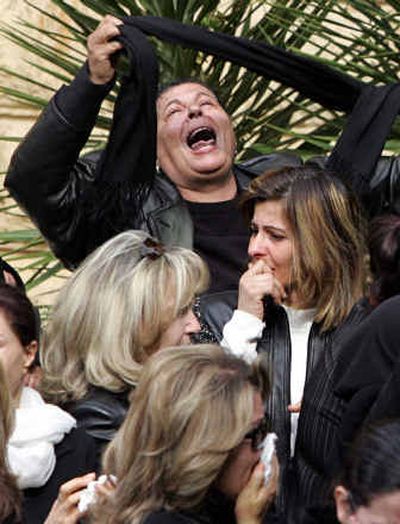Hariri funeral turns into rally

BEIRUT, Lebanon – Hundreds of thousands of Lebanese turned out Wednesday to bury their assassinated former prime minister, Rafik Hariri, in an outpouring of grief that turned into a rally against the Syrian and Lebanese governments.
It was one of the largest gatherings in Lebanon’s history, and it highlighted the depth of anger and political divisions in a country that was devastated by a 15-year civil war. The public outcry displayed at Hariri’s funeral is likely to intensify international pressure on Syria to end its political and military dominance over Lebanon.
Mourners carried banners saying “Syria Out!” and “Hey Syria; Who’s Next,” a reference to the widely held belief that Damascus was behind Hariri’s killing. As the funeral procession wound its way through Beirut’s shuttered streets, young men shouted insults at Syrian President Bashar Assad, calling on him to “remove your dogs from Lebanon.”
As Hariri’s cortege neared the imposing Mohammed Al-Amin Mosque in downtown Beirut, church bells began ringing loudly. The bells mixed with the chants of mourners, the solemn drumbeat of a military band and Quranic prayers warbling from the mosque’s minarets.
More than 200,000 people crowded into the square around the mosque, which is still under construction by a Hariri-owned company. After midday prayers, Hariri was buried in the mosque’s courtyard.
In a sign of his popularity, the funeral attracted Sunni Muslims, Christians and members of the Druze sect. Hariri was a Sunni, but he reached across Lebanon’s sectarian divisions by touting a nationalist message and setting up charities that provided aid to all sects. Only Shiite Muslims, who are mostly allied with Syria, did not participate heavily in the funeral.
Syria, which has kept thousands of troops here since the war broke out in 1975, has denied any involvement in the massive bombing that killed Hariri on Monday. Even if Syria was not behind Hariri’s death, it is likely to pay the political cost as pressure mounts on it to withdraw from its smaller neighbor.
“Mr. Hariri’s death should give – in fact it must give – renewed impetus to achieving a free, independent and sovereign Lebanon,” said Assistant Secretary of State William Burns, who represented the United States at the funeral.
Even as it acknowledged that there is no proof linking Syria to Hariri’s killing, the Bush administration recalled its ambassador to Damascus Tuesday. U.S. diplomats also pressed the United Nations Security Council to urge Syria to abide by a U.N. resolution calling on it to pull out of Lebanon.
For now, Syrian leaders and the Syrian-backed Lebanese government insist that Damascus will keep its 15,000 troops and vast intelligence apparatus here. But some Lebanese say the Syrians are making a mistake by not taking the Bush administration seriously.
Hariri’s family warned his longtime rival, Lebanese President Emile Lahoud, not to attend the funeral. Most of Lebanon’s other Syrian-backed leaders also stayed away. Syrian Vice President Abdul-Halim Khaddam, a close friend of Hariri, attended the burial but did not march in the procession.